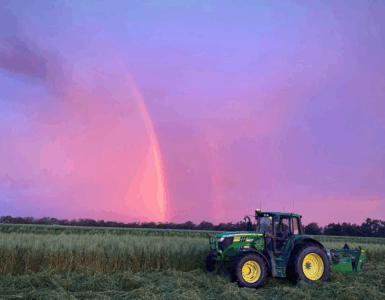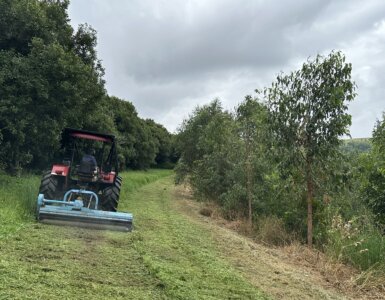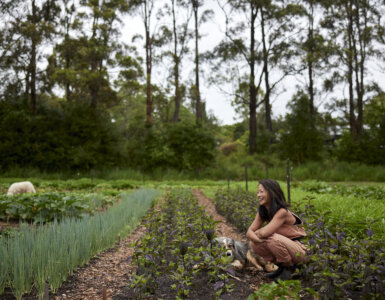‘Deep mulch’ and ‘compost teas’ may not be in our every day vernacular but at one commercial-scale market garden in southern NSW, they are commonly used terms.
Maple Tree Farm is all about healthy soil and nutrient rich vegetables. You won’t find a tractor in sight – everything is harvested by hand. The founder of the business is passionate about localised food systems and the land-share movement as a means to achieve that.
How to deep mulch
Founder of Maple Tree Farm Samuel Hansen describes deep mulch as a point of difference from other no-till vegetable growing methods. It’s achieved by taking an open pasture and laying down sheets of cardboard over the grass, which is then covered with compost, which becomes the growing bed. Finally, wood chips are laid in the pathways.
This method is no-till, no dig. It enables us to avoid using tractors and chemicals. I reckon it’s really going to take off as a growing method.”

Sam’s pathway to becoming a farmer
Sam has an International Business degree so farming wasn’t always on the agenda! It was while he was studying that a job stacking shelves at the supermarket lead to him become more conscious of the industrial food system. “I thought, I have to get involved with farming somehow.”
For a long time, I was a YouTube farmer.”
“I think I’ve watched every single Joel Salatin video there is on the internet,” he laughs. Taking the leap from observer to actual farmer was a big one, especially as a city boy with no rural background.
That’s where land-share became very attractive. After a long time searching, he was able to find a couple of farmers willing to hand over an unused parcel of land for a symbolic $1 a year lease. Specifically, Mussett Holdings Family Farm in the Southern Highlands and Tathra Place Free Range on the South Coast.

“If you’re not born into a farming family, there’s no way you can afford the $1.8 million loan to buy acreage. It’s ridiculous.” Sam hired a team to build 118 10-metre deep mulch beds in two days. “This whole idea of farmers growing farmers. If you have a farm already that’s producing, you have unused space, you can bring in a young farmer to set up an operation whereby they can run their own business.”
There are win-win benefits that are non-monetary.”
What does the farm look like?
The farms are no bigger than a football field. It’s intensive farming on small blocks. To do that, the soil has to be top-notch. Compost teas have been the key for Sam to add that extra boost to production.
“It enables the food web inside the soil to really develop. It’s filled with micro-organisms and fungi networks. We can manufacture soil life in a PVC tank and then flood it onto the gardens. It costs just dollars,” he says.
Sam’s dream is by 2030 to have a hundred deep mulch market gardeners in NSW.
I truly believe this method can scale and take off.”
We can produce food in large amounts without the need for petroleum based fertilisers or tractors or heavy machinery.” For anyone wondering what the monetary value of this kind of business would be, Sam recently successfully sold his Southern Highlands farm.

“I signed the land-share contract in September 2022, built the farm in October 2022 and then I sold the farm March 2023. We’ve set the precedent that we can actually trade these land-share businesses,” Sam explains.
Sam still runs his garden on the South Coast and his vegetable boxes are harvested and delivered the same day or the next.
Can you get lettuce that’s fresher than 18 hours hours?”
“People are really realising the importance of nutritionally dense food. I think there will be a tidal wave of demand. But to support that, we need to support the next generation of farmers. That’s what excites me.”
Hear more stories like this by subscribing to the Telling Our Story podcast on iTunes (or wherever you listen to podcasts) and follow podcast host Angie Asimus on Instagram for more updates.







































Add comment